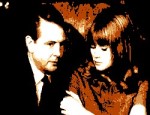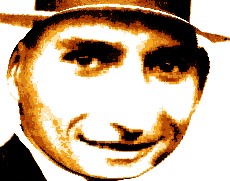Film Review

Dieu seul me voit is a light romantic comedy that can hardly fail to please, the Podalydès brothers' quirky and often absurdist humour bringing a fresh, unfamiliar edge to a well-worn genre. Denis Podalydès' well-meaning but seemingly doomed attempts to find his ideal woman are a delight to watch but the main attraction are some unexpected excursions towards the surreal, such as a bizarre blood donor sequence. The icing on the cake is the final segment of the film in which our unsuccessful Don Juan attempts to ply a splendiferous Jeanne Balibar with his self-effacing charms - it's like watching a ritual sacrifice in slow motion. A commercial and critical success, the film was honoured with the César for the Best First Work in 1999. A decade on, the Podalydès brothers would complete their Versailles trilogy with Bancs publics (Versailles rive droite) (2009).
© James Travers 2002
The above content is owned by frenchfilms.org and must not be copied.
Film Synopsis
Albert, a shy absent-minded sound engineer, is coming to a mid-life crisis. Despite his best attempts, he still has not found the woman of his dreams - but that looks set to change. Whilst working on a political campaign in Toulouse, he meets a nurse, Sophie, who draws him into a romantic liaison which ends when her ex-boyfriend makes an unwelcome return. Later, back in Paris, he has a one-night stand with a police woman, Corine, without realising that their night of passion is being relayed by his mobile phone to her jealous boyfriend. Then there is the dinner date with a documentary film maker Anna, which looks promising, until Albert starts to have an uncontrollable fit of vomiting...© James Travers
The above content is owned by frenchfilms.org and must not be copied.
Similar Films
Here are some other films you may enjoy watching:- L'Amour dure trois ans (2012)
- Décalage horaire (2002)
- Ensemble, nous allons vivre une très, très grande histoire d'amour... (2010)
- La Fée (2011)
- Chacun cherche son chat (1996)
Other related links:
Film Credits
- Director: Bruno Podalydès
- Script: Bruno Podalydès, Denis Podalydès (dialogue)
- Cinematographer: Pierre Stoeber
- Cast: Denis Podalydès (Albert), Jeanne Balibar (Anna), Isabelle Candelier (Sophie), Cécile Bouillot (Corinne), Jean-Noël Brouté (Otto), Michel Vuillermoz (François), Mouss (Cruquet), Philippe Uchan (Patrick), Daniel Ceccaldi (Polling station président), Maurice Baquet (M. Crémieux), Pierre Diot (Denis Boulet), Mathieu Amalric (Atchoum), Michel Butel (Himself), Gérard Dauzat (Maire de Verseilles), Philippe Duclos (Père de Sophie), Bernard-Paul Ekodo (Policeman), David Gabison (Maire), Élodie Huber (Indira Cruquet), Gisèle Joly (Madame Rembrel), Thierry Lièvre (Policeman)
- Country: France
- Language: French
- Support: Color
- Runtime: 120 min
- Aka: Only God Sees Me
The very best of the French New Wave

The brighter side of Franz Kafka

The very best sci-fi movies
